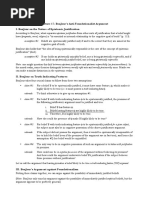Carvaka Epistemology Pdf


This article provides an introduction to Buddhist epistemology. It flattens out a number of the philosophical and exegetical differences between major Buddhist Epistemologists, concentrating primarily on Dharmakīrti's views. Historically, Dharmakīrti was the main source for important Buddhist writers on epistemology from the seventh to ninth centuries as well as for the influential later Indian philosophers.
Charvaka philosophy pdf The Carvaka sweet-talkers. The Epistemology of the Carvaka Philosophy. Charvaka philosophy in malayalam The Carvaka.ISSN 1970-0164. THE CARVAKA PHILOSOPHY. PDF) logging in or signing up. THE CARVAKA PHILOSOPHY. THE CARVAKA EPISTEMOLOGY.
Dharmakīrti's “seven works on epistemology” ( tshad ma sde bdun) were also the source for the rich Tibetan traditions of tshad ma-studies (i.e., pramāṇavāda). Access to the complete content on Oxford Handbooks Online requires a subscription or purchase. Public users are able to search the site and view the abstracts and keywords for each book and chapter without a subscription.
Please or to access full text content. Crazy Domains Reseller Program here. If you have purchased a print title that contains an access token, please see the token for information about how to register your code. For questions on access or troubleshooting, please check our, and if you can't find the answer there, please.
The carvaka philosophy • 1. THE CARVAKA PHILOSOPHYAJIT SINGHENGLISH TRAINER • ORIGINCarvaka is the that generally stands for “Materialist”According to one view “Carvaka was was named after a sage who propounded materialism.”“Carvaka was even originally a common descriptive name given to a materialist, either because he preaches the doctrine of ‘eat, drink and be merry (carv-eat,chew), or because his words are pleasant and nice (caru-nice, vak-word). • THE CARVAKA EPISTEMOLOGYThe entire philosophy of the Carvaka may be said to depend logically on their epistemology or the theory of knowledge. • PROBLEMS OF THE EPISTEMOLOGYHow far can we know reality?How does knowledge originate and develop?What are the different sources of knowledge? • CHIEF TOPICS OF INDIAN EPITEMOLOGYKnowledge of reality or valid cognition is called prama and the source of such knowledge is called pramana. The Carvaka holds that perception is the only pramana or dependable source of knowledge. • CRITICISMHe criticizes the possibility of the other sources of knowledge like inference and testimony which are regarded as valid pramanas by many philosophers.
• INFERENCE IS NOT CERTAINIf inference is to be regarded as pramanas, it must yield knowledge about which we can have no doubt which must be true to reality.Inference is an uncertain leap from known to the unknown.For, it depends on a universal relation between the middle and the major term and no such relation can be ascertained. • TESTIMONY IS NOT A SAFE SOURCE OF KNOWLEDGETestimony relating to unperceived objects is not reliable.Even the Vedas are not reliable.Testimony supported by inference is as uncertain as inference.
• METAPHYSICSMetaphysics is the theory of reality.Matter is only reality, it alone is perceived.God, soul, heaven, life before death or after death, and any unperceived law cannot be believed in, because they are all beyond perception. • THE WORLD IS MADE OF FOUR ELEMENTSMatter is composed of four elements.Ether (akasa)Air (vayu)Fire (agni)Water (ap)Earth (ksiti) • CARVAKAS VIEW IN PANCHABUTA TATVAThe Carvaka rejects ether, because its existence is cannot be perceived.The material world is therefore is made of the for perceptible elements.Not only non-living material objects but also living organisms, like plants animal bodies, are composed of these four elements. • THERE IS NO SOULThe Carvakas admit that the existence of the consciousness is proved by perception.The soul is nothing but the living body, with the quality of consciousness.If the existence of a soul apart from the body is not proved, there is no possibility of proving its immortality. • THERE IS NO GODThe supposition of God as a creator is un-necessary.
The world comes into existence by the spontaneous combination of material elements.The Carvakas, therefore, prefer atheism. • A QUESTION?Do we not require an efficient cause like God as a shaper and designer who turns the material elements into this wonderful world, like a potter shapes the pot with his efficiency?Carvakas: The material elements themselves have got each its fixed nature (svabhava). It is by the natures and laws inherent in them that they combine together to from this world. • ETHICSEthics is the science of morality. It discusses problems like: What is the highest goal man can achieve?What should be the end of human conduct?What is the standard of moral judgment?
• CARVAKAS’ METAPHYSICAL THEORIES IN CONFORMITY WITH ETHICAL PROBLEMSHeaven is a myth and cannot be the goal of life.Liberation as freedom from all pains, is an impossible ideal. Driver Intel 6 Series Chipset Family Smbus Controller here. Pleasure though mixed with pain, is the only possible good.Pleasure is the ideal of life. • CARVAKAS THE HEDONISTSIf we remember that our existence is confined to the existence of the body and to this life, we must regard the pleasure arising in the body as the only good thing we can obtain.The Carvakas ethics may called therefore, hedonism or the theory that pleasure is the highest goal. • CONCLUSIONLike the Epicureans of Greece, the Carvakas in India have been more hated than understood.Carvaka in the mind of people at large is a term of reproach.But, it is useful for student of philosophy to remember as well what Indian philosophy owes to the Carvaka. • CONTRIBUTON OF THE CARVAKASThe Carvaka view that no inference can yield certain knowledge is the view of many contemporary Western thinkers like the pragmatists and logical positivists. So it may be noted that the contribution of the Carvaka epistemology is not insignificant. Cid Serial Free Episode Download.
Comments are closed.